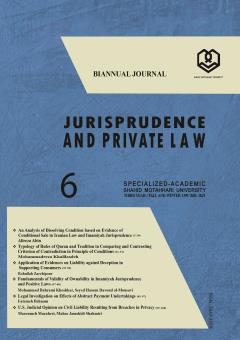-
-
-
Open Access Article
1 - A Jurisprudential Study of Guaranteeing Principal Capital in Commissioned Manufacture Bonds
Masoumeh Mazaheri Hamideh Goushi DehaqiAbstract:In Islamic Sharia law, with respect to the rule of the association of profit and loss, basically the principal capital return is not guaranteed. Therefore, gaining real profit is always associated with the possibility of loss and damage. Whereas in Islamic fina MoreAbstract:In Islamic Sharia law, with respect to the rule of the association of profit and loss, basically the principal capital return is not guaranteed. Therefore, gaining real profit is always associated with the possibility of loss and damage. Whereas in Islamic financial mechanisms such as commissioned manufacture bonds, the payment of the nominal value included in the bonds is guaranteed by the publisher in due date. Therefore, the owners of the bonds who are the investors of transactions will not sustain a loss or receive a reward for the reduction or increase in the value of the project upon receiving the nominal value of the bonds (principal capital). However, an analysis of the procedure for publication of the bonds, makes it clear that in commissioned manufacture bonds based on interest, the receipt of nominal value of the bonds will be realized according to the entitlement of the owners in due date proportionate to the total value of the amount due. Also guaranteeing the principal capital by the publisher of the commissioned manufacture bonds is according to the liability of the seller to pay for the object of sale. Moreover, the owners of the bonds as the buyers only own the amount due in duty of the debtor and they shall have no right in project thus commissioned. In this sense, any increase or reduction in the value of the project will have no effect in the amount of their claim. Whereas the owners of commissioned manufacture bonds along with rent with an ownership option are the joint owners of the project, thus in case of increase in project value in connection with the nominal value of the bonds, they are entitled to claim the value added. This is because according to the rule of logics the owner of actual property deserves to take a share of the increase in value of actual property value as he is to sustain the damages incurred on the actual property. Similarly, the reduction in project value in proportion to the nominal value of the commissioned manufacture bonds along with the rent with an ownership option, must be attributable to the joint owners, i.e. investors. Manuscript profile
List of Articles Hamideh Goushi Dehaqi
-
The rights to this website are owned by the Raimag Press Management System.
Copyright © 2017-2024


